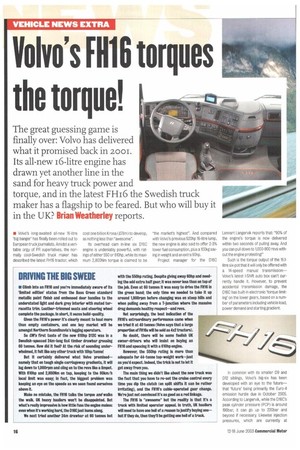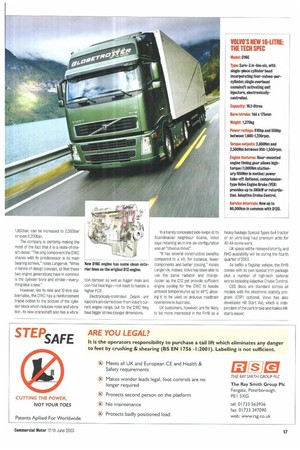Volvo's FH16 torques
Page 16

Page 17

If you've noticed an error in this article please click here to report it so we can fix it.
the torque! 1.—=
The great guessing game is finally over: Volvo has delivered
what it promised back in 2001.
Its all-new 16-litre engine has drawn yet another line in the sand for heavy truck power and torque, and in the latest FHI6 the Swedish truck maker has a flagship to be feared. But who will buy it
in the UK? Brian Weatherley reports.
• Volvo's long-awaited all-new 16-litre 'big banger' has finally been rolled out to European truck journalists. Amidst a veritable orgy of PR superlatives, the normally cool-Swedish truck maker has described the latest FH16 tractor, which
cost one billion Krona (£78m) to develop, as nothing less than "awesome".
Its overhead cam in-line six D160 engine is undeniably powerful, with ratings of either 550 or 610hp, while its maximum 2,800Nm torque is claimed to be
"the market's highest". And compared with Volvo's previous 520hp 16-litre lump, the new engine is also said to offer 2-3% lower fuel consumption, plus a 100kg saving in weight and an extra 90hp.
Project manager for the 1:1160 Lennart Langervik reports that: "90% of the engine's torque is now delivered within two seconds of polling away. And you can pull down to 1,000-900 revs without the engine protesting!"
Such is the torque output of the 161litre six-pot that it will only be offered with a 14-speed manual transmission— Volvo's latest I-Shift auto box can't currently handle it. However, to prevent accidental transmission damage, the DIE has built-in electronic 'torque limiting' on the lower gears, based an a number of parameters including vehicle load, power demand and starting gradient.
In common with its smaller D9 and D12 siblings, Volvo's big-six has been developed with an eye to the future— that 'future' being primarily the Euro-4 emission hurdle due in October 2005. According to Langervik, while the D16C's peak cylinder pressure (PCP) is around 190bar, it can go up to 220bar and beyond if necessary. Likewise injection pressures, which are currently at 1,800bar, can be increased to 2,000bar or even 2,200bar.
The company is certainly making the most of the fact that it is a state-of-theart diesel. "The only component the D16C shares with its predecessor is its main bearing screws," notes Langervik. "While in terms of design concept, all that these two engine generations have in common is the cylinder bore and stroke—everything else is new."
However, like its nine and 12-litre stablemates, the DISC has a reinforcement frame bolted to the bottom of the cylinder block which reduces noise and vibration, its new crankshaft also has a vibra tion damper as well as bigger main and con-rod bearings—rot least to handle a higher PCP.
Electronically-controlled Delphi unit injectors are carried over from Volvo's current engine range, but for the D16C they have bigger stroke/plunger dimensions.
In a barely concealed side-swipe at its Scandinavian neighbour Scania, Volvo says retaining an in-line six configuration was an "obvious move".
"It has several construction benefits compared to a V8, for instance, fewer components and better cooling," insists Langervik. Indeed, Volvo has been able to use the same radiator and chargecooler as the D12 yet provide sufficient engine cooling for the D16C to handle ambient temperatures up to 48°C allowing it to be used on arduous roadtrain operations in Australia.
UK customers, however, are far likely to be more interested in the FH16 as a heavy haulage Special Types 6x4 tractor or an ultra-long haul premium artic for 40-44-tonne work.
UK specs will be released shortly, and RHD availability will be during the fourth quarter of 2003.
As befits a flagship vehicle, the FH16 comes with its own special trim package plus a number of high-tech optional extras including Adaptive Cruise Control.
EBS discs are standard across all models with the electronic stability program (ESP) optional. Volvo has also developed Hill Start Aid, which is independent of the park brake and makes hillstarts easier.












































































































































































